Intel Core i9-9900K 9th Gen CPU Review: Fastest Gaming Processor Ever
Why you can trust Tom's Hardware
VRMark, 3DMark & AotS: Escalation
VRMark, 3DMark
We aren't big fans of using synthetic benchmarks to measure performance, but 3DMark's DX11 and DX12 CPU tests provide useful insight into the amount of horsepower available to game engines.
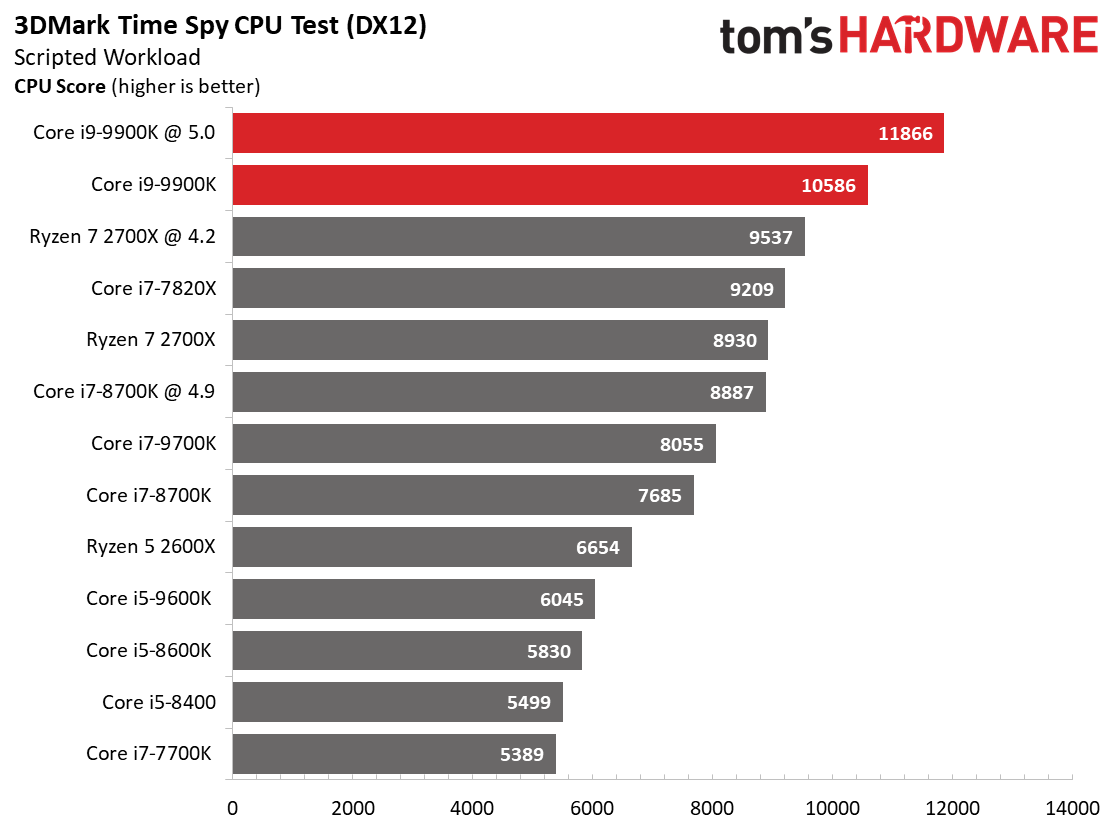
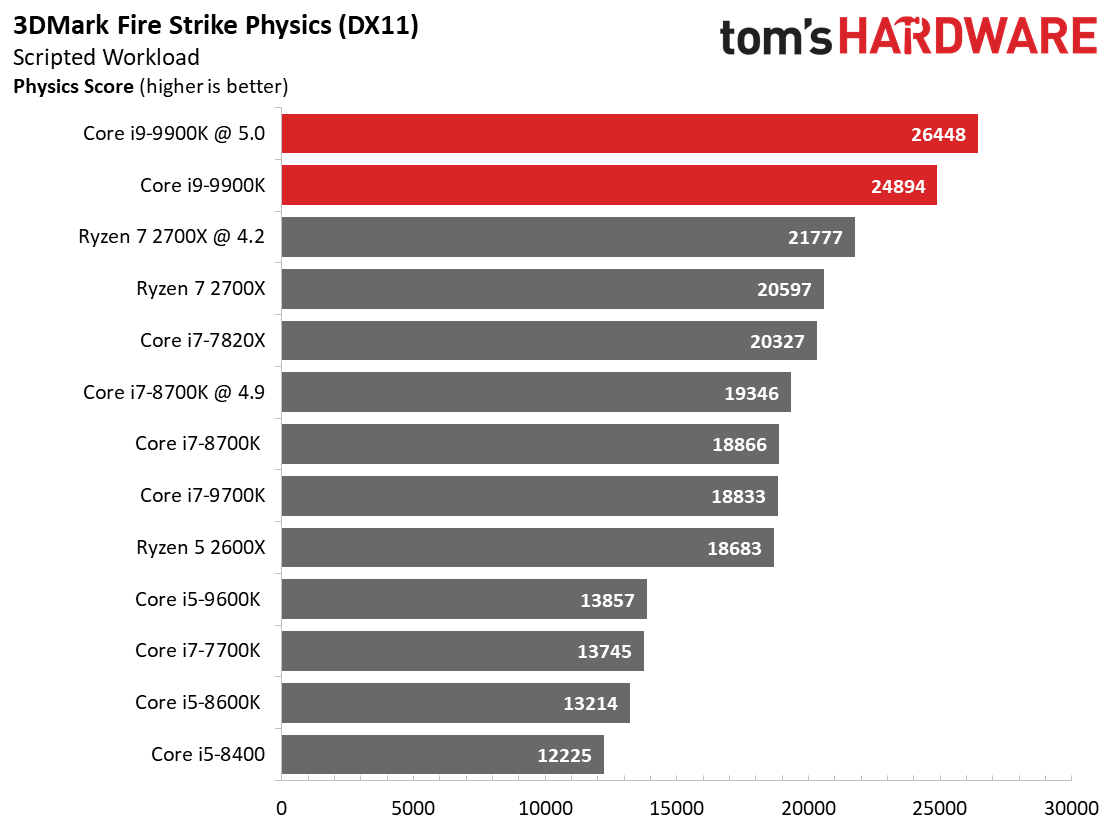
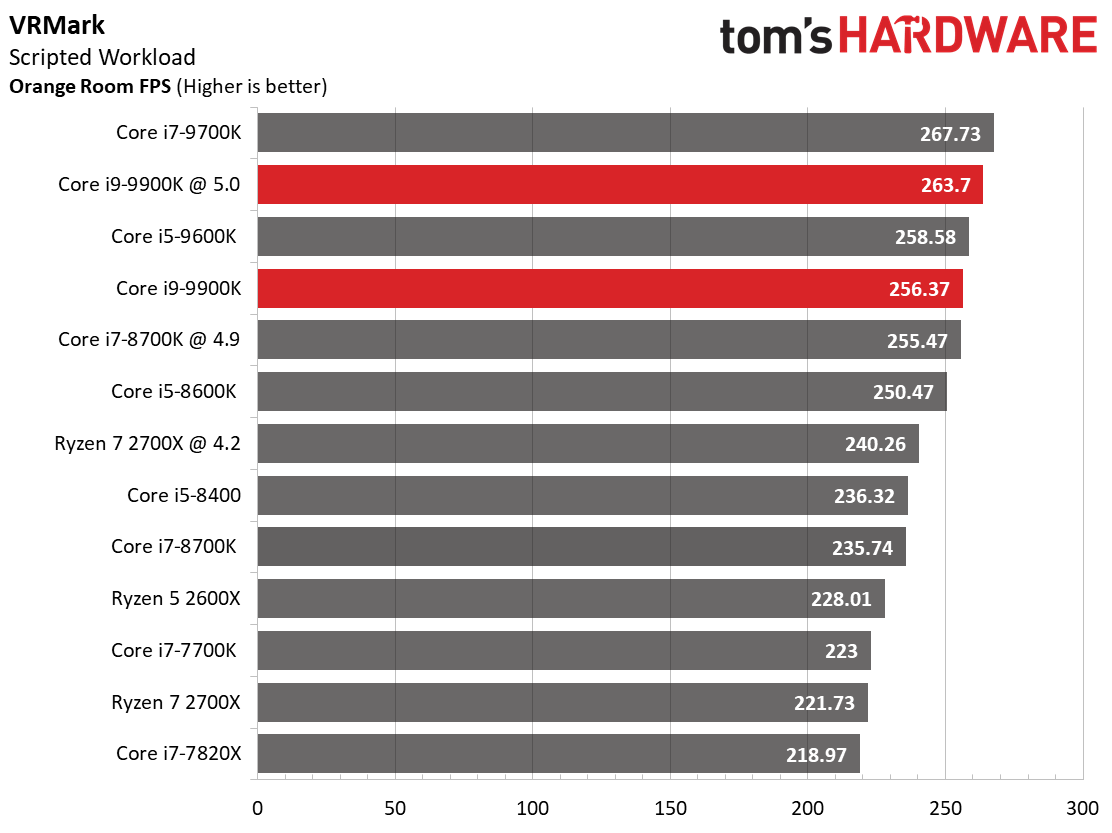
The Core i9-9900K's eight cores easily beat Ryzen 7 2700X during the DX12 and DX11 CPU benchmarks. For perspective, the Core i9-9900K has the same 4.7 GHz all-core boost frequency as the Core i7-8700K's single-core boost, which is quite impressive. As expected, tuning Core i9-9900K propels it into a league of its own.
In the DX12 test, we see a nice step forward from Core i7-9700K compared to its predecessor, the Core i7-8700K. That improvement is despite a loss of Hyper-Threading technology on the new Core i7 model.
Architecturally, the Core i5-9600K is very similar to Core i5-8600K. They offer the same number of cores. But the newer chip's higher clock rates deliver tangible gains.
UL's VRMark test lets you gauge your system's suitability for use with the HTC Vive or Oculus Rift, even if you don't currently own an HMD. UL defines a passing score as anything above 109 FPS. The Core i7-9700K posts a surprisingly strong frame rate, beating the overclocked -9900K. That implies this benchmark runs best on eight physical cores.
Ashes of the Singularity: Escalation
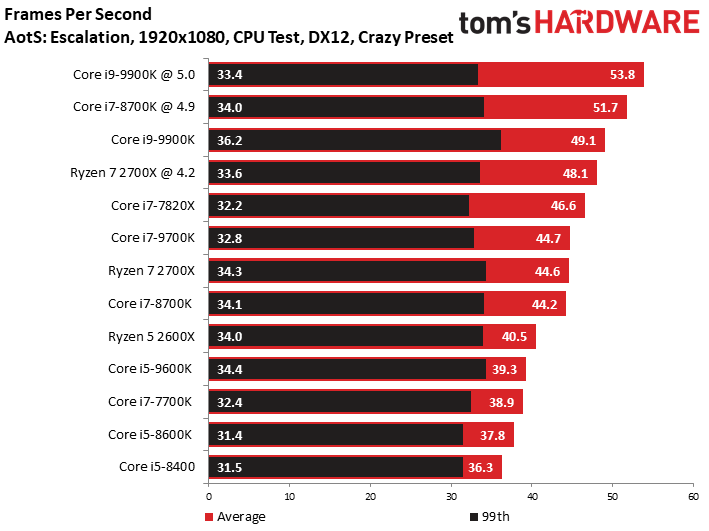
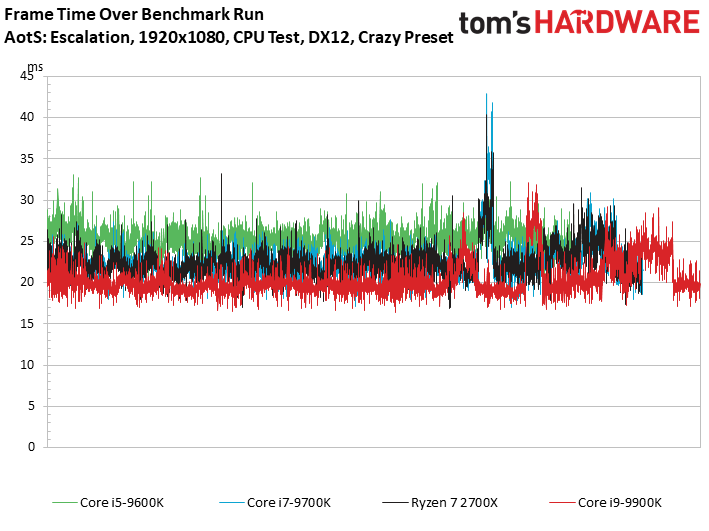

Ashes of the Singularity: Escalation is a computationally intense title that scales well with thread count. A stock Core i9-9900K beats the rest of the processors, except for an overclocked Core i7-8700K.
MORE: Best CPUs
Get Tom's Hardware's best news and in-depth reviews, straight to your inbox.
MORE: CPU Benchmark Hierarchy
MORE: All CPUs Content
Current page: VRMark, 3DMark & AotS: Escalation
Prev Page Hardware-Based Security Fixes, Architecture & Test Setup Next Page Civilization VI Graphics & AI, Dawn of War III
Paul Alcorn is the Editor-in-Chief for Tom's Hardware US. He also writes news and reviews on CPUs, storage, and enterprise hardware.
-
dlim389 "The better the cooling, the better power consumption"? What?! This doesn't make sense at all. You meant the better the cooling, the lower the temperature.Reply -
siman0 "Redefine" at double the price of a 2700x it needs to do more than that. The price diffrence is more than enough to go up another GPU tier ie 1070ti to a 1080ti. Id rather have more pcie bandwidth and the ability to upgrade my cpu till 2020. The only way Id recommend a upgrade to something close is if you already have the motherboard. But even then Id say the 9700k.Reply -
s1mon7 Wait, so it performs within a spitting distance of the 2700x with DOUBLE the power consumption and price? Holy smokes, I thought Intel will be able to easily take on AMD after they launch their 8-cores. I have to say that these results were very surprising to me, since I believed in this being the ace up Intel's sleeve. This is really interesting, and a big win for AMD. The 9900K goes through twice the power just to squeeze out that extra clock speed edge to outperform the 2700x by a mere 10%, at double the price, mind you.Reply
Intel clearly needs 10nm and a new architecture to go back into the game. As is, I struggle to think of any reason to buy the 9900k. -
TCA_ChinChin Interesting chip from Intel, but if you are looking at CPUs from a performance per dollar point of view, its rather disappointing. The real disappointment is the 9700k which is more expensive than the 8700k but performs basically the same on average.Reply -
Adrian Ocampo As a gamer, why would I buy a 9700K when an 8700K trades blows with the 9900K in both gaming and productivity. It just doesn't make sense. Its like its just competing with its own product as this point. I would be better off buying an 8700K deliding it, put liquid metal and overclock to 5.0Ghz for a much lower price than a 9900K.Reply -
gfaiii Guys just as a heads up you should say second generation 1151 socket, these are NOT compatible with 200 series boards that have 1151 sockets (without modding)Reply -
sonichedgehog360 Ladies and gentlemen, Intel’s FX 9000 series.Reply
(By the way, I totally saw this coming what with the crazy clock speeds they were pushing.) -
Johnpombrio I was surprised on how well the i9-9900K did on stock clocks. I may not even bother with overclocking as it does well even without it and I may be able to use air cooling that way. Compared to my Kaby Lake i7-7700K, it definitely is a big step up. I already have the ASUS Strix Z380 mobo, 32GB Corsair Dominator Platinum memory kit and have preordered the CPU.Reply -
redgarl For the money, you can buy a motherboard, a CPU and a 1080 GTX for the same price as the 9900k with it's motherboard.Reply
Also, you tested this system on a 600$ motherboard... 600$ and a prenium cooling solution.
This system is above the 2000$ threshold compared to an AMD one barely hitting the 1000$.